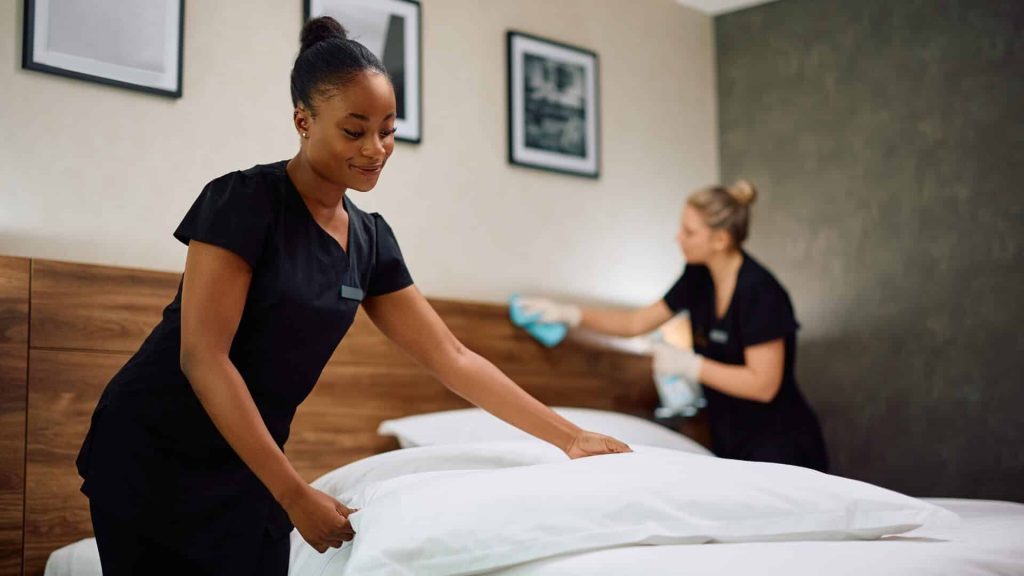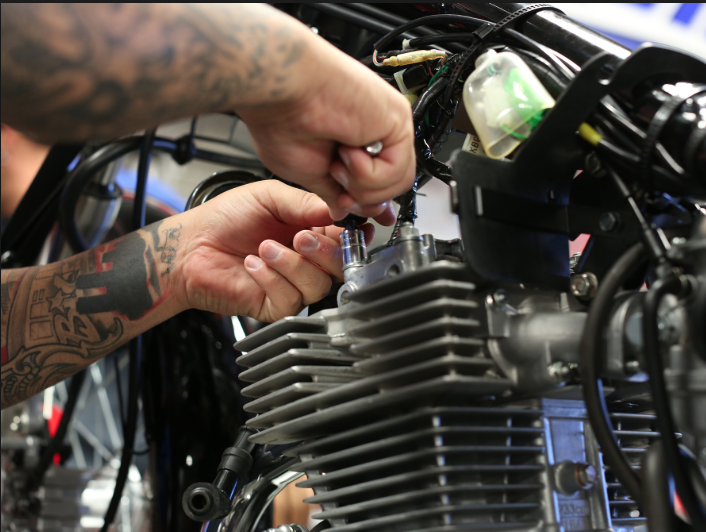How to Get a Housekeeping Job in the U.S. with Visa Sponsorship
The United States offers many job opportunities for people from around the world, and housekeeping is one field where international workers can shine. If you’re looking to work as a housekeeper in the U.S. but don’t have a college degree, you can still achieve your goal, especially with visa sponsorship. Housekeeping jobs are in high demand, and some employers are willing to sponsor foreign workers to fill these roles. This article explains how to find housekeeping jobs in the U.S. with visa sponsorship, the skills you need, the visa options available, and practical steps to make your dream a reality. Whether you’re new to housekeeping or have experience, this guide uses simple words to help you understand the process.
Why Housekeeping Jobs Are Popular in the U.S.
Housekeeping jobs are essential in the U.S. because they keep homes, hotels, hospitals, and offices clean and comfortable. With busy lifestyles, many people and businesses rely on housekeepers to maintain tidy spaces. The hospitality industry, including hotels and resorts, is a major employer of housekeepers, especially in tourist-heavy states like Florida, California, and Nevada. The U.S. Bureau of Labor Statistics reports that jobs for maids and housekeeping cleaners will grow by 7% from 2020 to 2030, driven by demand in healthcare and hospitality.
These jobs are appealing for international workers because they don’t require a degree. Employers value hard work, reliability, and attention to detail over formal education. In areas with labor shortages, such as rural towns or busy cities, employers often sponsor visas to hire dedicated housekeepers from other countries. This makes housekeeping a great entry point for those wanting to live and work in the U.S.
What Is Visa Sponsorship for Housekeeping Jobs?
Visa sponsorship means a U.S. employer agrees to help a foreign worker get a visa to work legally in the country. The employer supports the visa application by providing paperwork, proving the job is necessary, and sometimes paying fees. For housekeepers without a degree, visa sponsorship is crucial because it’s the only way to work in the U.S. legally. Without it, getting a work visa is nearly impossible.
Sponsorship happens when an employer can’t find enough U.S. workers for housekeeping roles. This is common in industries like hospitality, where the demand for cleaners is high, especially during peak seasons. Understanding visa sponsorship is the first step to landing a housekeeping job in the U.S.
Types of Housekeeping Jobs Available
Housekeeping jobs vary depending on the workplace and tasks. Most don’t require a degree, but they need energy and a willingness to learn. Here are some common housekeeping roles that may offer visa sponsorship:
Hotel Housekeeper
Hotel housekeepers clean guest rooms, change bed linens, restock towels, and vacuum floors. They work in hotels, motels, or resorts, ensuring guests have a pleasant stay. This job is fast-paced, especially during busy seasons, and requires teamwork. No degree is needed, and many hotels provide training.
Private Home Housekeeper
Private home housekeepers work for families or individuals, cleaning houses or apartments. Tasks include dusting, mopping, laundry, and sometimes cooking or organizing. This job suits people who prefer a quieter environment and enjoy building trust with clients. Experience helps, but employers often teach you on the job.
Hospital or Healthcare Facility Housekeeper
Housekeepers in hospitals or nursing homes clean patient rooms, hallways, and common areas. They follow strict hygiene rules to keep spaces safe and germ-free. This role is rewarding for those who want to support healthcare but don’t have medical training. Employers usually provide safety training.
Office or Commercial Housekeeper
Commercial housekeepers clean offices, schools, or stores, often after business hours. They empty trash, clean desks, and maintain restrooms. This job is ideal for those who like working independently. No formal education is required, and tasks are straightforward.
Vacation Rental Cleaner
With the rise of platforms like Airbnb, vacation rental cleaners are in demand. They prepare short-term rental properties between guests, ensuring everything is spotless. This job is common in tourist areas and may involve flexible hours. Training is minimal, making it accessible for newcomers.
These roles are entry-level, meaning they’re open to people with little or no formal education. Employers often provide on-the-job training, which is great for international workers seeking visa sponsorship.
Visa Options for Housekeepers Without a Degree
To work as a housekeeper in the U.S., you need a work visa. Not all visas are suitable for housekeepers without a degree, but several options fit this group. Here’s what’s available:
H-2B Visa for Temporary Non-Agricultural Workers
The H-2B visa is the most common for housekeeping jobs. It’s for temporary, non-agricultural work, like cleaning in hotels or resorts. Employers must show they can’t find U.S. workers and that the job is temporary, often lasting less than a year. This visa is popular in tourist areas with seasonal demand, like summer resorts or ski lodges. It can be extended up to three years in some cases.
EB-3 Visa for Unskilled Workers
The EB-3 visa is a permanent work visa, also known as a green card. It’s available for unskilled workers, including housekeepers, if an employer sponsors them. The process is longer than the H-2B, requiring labor certification to prove no U.S. workers are available. If approved, the EB-3 lets you live and work in the U.S. permanently. This is ideal for housekeepers planning a long-term career.
J-1 Visa for Cultural Exchange
The J-1 visa is less common for housekeeping but applies to some cultural exchange programs, like au pair roles that include light cleaning. It’s for younger workers (usually 18-26) who want to live with a U.S. family and learn about American culture. The visa lasts one to two years and doesn’t require a degree, but you must apply through an approved program.
Other Visa Notes
Other visas, like the TN visa (for Canadians and Mexicans) or student visas (F-1) with work permission, are rarely used for housekeeping. The H-2B and EB-3 are the main paths for housekeepers without a degree. The J-1 is an option for specific cases.
Who Qualifies for Visa Sponsorship as a Housekeeper?
To get a housekeeping job with visa sponsorship, you need to meet basic requirements. Experience is helpful but not always necessary. If you’ve cleaned homes, hotels, or offices before, it shows you understand the work. Even informal experience, like cleaning for family or neighbors, counts. Some employers ask for references to verify your skills.
Basic English is often required to follow instructions and communicate with supervisors or clients. If you speak other languages, like Spanish, it can be a bonus in diverse areas. A clean background check is standard, as employers want trustworthy workers. Physical stamina is also important, as housekeeping involves standing, lifting, and moving for hours.
For H-2B or EB-3 visas, the employer must prove they need foreign workers. Showing you’re reliable and eager to work makes you a strong candidate for sponsorship.

Steps to Find Housekeeping Jobs with Visa Sponsorship
Finding a housekeeping job with visa sponsorship requires effort, but it’s doable with the right strategy. Focus on employers open to hiring international workers. Here’s how to get started.
Target High-Demand Areas
Some U.S. regions have a greater need for housekeepers. Tourist hotspots like Las Vegas, Orlando, or Miami need hotel cleaners year-round or during peak seasons. Rural areas, where local workers are scarce, may also offer sponsorship. Healthcare facilities in states like Texas or New York often seek housekeepers for hospitals. Research hotels, cleaning companies, or healthcare providers in these areas.
Search Online Job Boards
Job websites are a good place to find housekeeping jobs. Sites like Indeed, Glassdoor, or LinkedIn list openings, and some let you filter for visa sponsorship. Use search terms like “housekeeping visa sponsorship,” “H-2B hotel cleaner,” or “EB-3 housekeeper jobs.” Specialized platforms like Hcareers.com (for hospitality) or CleaningJobs.com also have relevant listings.
Partner with Recruitment Agencies
Recruitment agencies can connect you with U.S. employers who sponsor visas. Some focus on hospitality or cleaning jobs. Agencies like Labor Finders or International Recruitment Exchange Services (IRES) help with H-2B or EB-3 placements. Research agencies carefully to avoid scams. Legitimate ones charge employers, not workers.
Network for Opportunities
Talking to others in housekeeping can uncover job leads. Join online groups on Facebook, Reddit, or LinkedIn for international workers or cleaners. These communities share job postings and tips. If you have friends or family in the U.S., ask them to recommend you to employers. Personal connections can make a difference.
Reach Out to Employers
Not all visa sponsorship jobs are advertised. Contact hotels, cleaning services, or hospitals directly. Send a polite email or call to ask if they hire international housekeepers and offer sponsorship. Even if they’re not hiring now, they may consider you later. Be professional and follow up without being pushy.
Building a Strong Job Application
When you find a job opening, your application needs to stand out. Create a simple resume that highlights your cleaning experience, skills, and reliability. If you lack formal experience, mention tasks like cleaning your home or helping others. Keep the resume to one page and use clear words.
Write a cover letter explaining why you want to work as a housekeeper in the U.S. Mention your work ethic and interest in visa sponsorship. If English isn’t your first language, ask someone to review your resume and letter for mistakes.
For interviews, practice answering questions like “Why do you want this job?” or “How do you handle a tough cleaning task?” If the interview is virtual, check your internet and camera beforehand. Dress neatly and smile, even if you’re nervous. Showing enthusiasm can impress employers.
Navigating the Visa Application Process
Once you get a job offer, the visa process starts. The employer usually handles most of it, but you’ll need to provide documents. For an H-2B visa, the employer files a petition with the U.S. Department of Labor and U.S. Citizenship and Immigration Services (USCIS). They prove the job is temporary and no U.S. workers are available. You’ll need a valid passport, photos, and sometimes proof of experience.
The EB-3 visa takes longer. The employer applies for labor certification, which can take months, then files an immigrant petition with USCIS. You may need an interview at a U.S. embassy in your country. The J-1 visa involves applying through a cultural exchange program, which guides you.
Visa costs depend on the type. Employers often pay H-2B fees, but you may cover travel or embassy costs. EB-3 fees are higher, and some employers share them. Clarify costs with your employer upfront.
Overcoming Common Challenges
Moving to the U.S. for a housekeeping job has challenges. One is the cost of travel, housing, or living expenses before your first paycheck. Save money in advance to cover these. Another challenge is adjusting to U.S. life. The culture or work pace may feel unfamiliar. Joining community groups or connecting with other immigrants can help you feel at home.
Finding a sponsoring employer can be tough, as some prefer local workers. Keep applying and follow up with interested employers. Rejection is normal, so stay patient and keep trying.
Tips for Thriving as a Housekeeper in the U.S.
To succeed, always be punctual and follow instructions carefully. Small details, like folding towels neatly, show you care about your work. If you’re unsure about a task, ask your supervisor. It’s better to learn than to guess.
Take any training offered, like cleaning techniques or safety protocols. This can lead to better jobs or raises. If you’re on an H-2B visa, explore options to extend your stay or apply for an EB-3 visa for permanence.
Housekeeping jobs pay $10 to $18 per hour, depending on the location and employer. Budget wisely, as rent and food can be expensive. Saving even a little each month helps you stay secure.
Understanding U.S. Work Culture
The U.S. workplace values timeliness and professionalism. Arrive on time for every shift, as lateness can hurt your job. Communicate clearly, even if your English is basic. Ask for help if you don’t understand something. Showing initiative, like cleaning an extra area, impresses supervisors.
Housekeeping can be physically demanding, with long hours of standing or bending. Stay healthy by eating well and resting. Managing stress, like taking short walks, keeps you energized for work.
Legal and Ethical Duties
Housekeepers must keep workplaces safe and clean. Follow rules, like using the right cleaning products or wearing gloves in hospitals. Never take or damage a client’s property, as this can cost you your job or visa. If you notice unsafe conditions, like a spill, report it to your supervisor.
Respect privacy, especially in private homes or hotels. Don’t share details about clients or guests. Acting with honesty builds trust and protects your reputation.
Long-Term Career Paths
Housekeeping can lead to bigger opportunities. With experience, you could become a housekeeping supervisor or manager, overseeing a team. Some housekeepers move into related fields, like hospitality management, with extra training. Short courses at community colleges can teach these skills.
If you’re on an EB-3 visa, you can work toward U.S. citizenship after a few years. Some housekeepers start their own cleaning businesses, serving homes or offices. This takes planning but offers independence and higher earnings.
Resources for International Housekeepers
Several organizations support international workers. The National Employment Law Project offers advice on workers’ rights. For visa help, check the U.S. embassy website in your country. Apps like Babbel can improve your English if needed.
Online communities, like Reddit’s r/immigration or hospitality groups on LinkedIn, let you connect with others. These platforms share job tips and encouragement, making the process less lonely.
Busting Myths About Visa Sponsorship
Some think visa sponsorship is only for skilled jobs with degrees. That’s false. Housekeeping qualifies for H-2B or EB-3 visas because of worker shortages. Another myth is that sponsorship is a quick ticket to a job. You still need to apply, interview, and meet visa rules.
People also believe the process is too costly or complex. While it takes time, many employers handle the paperwork and fees. With the right employer, it’s manageable.
Success Stories to Inspire You
Real stories show what’s possible. Ana, from Guatemala, got an H-2B visa in 2024 to work as a hotel housekeeper in Colorado. She earned $14 an hour and impressed her employer, who later sponsored her for an EB-3 visa. Ana says practicing English and being friendly helped her succeed.
Then there’s Kwame, from Ghana, who worked as a hospital housekeeper on an H-2B visa in Texas. His hard work led to a promotion to team leader within a year. These examples prove that with effort, housekeeping jobs with visa sponsorship are achievable.
Final Thoughts on Housekeeping Jobs with Visa Sponsorship
Housekeeping jobs in the U.S. offer a real chance for international workers without a degree. The demand for cleaners in hotels, homes, and hospitals is strong, and visas like H-2B and EB-3 make it possible to work legally. By researching jobs, building a solid application, and staying determined, you can find an employer who’ll sponsor you. The road may have bumps, but the reward of working in the U.S. is worth it.
Begin by exploring job boards, contacting agencies, and improving your skills. With persistence and the right resources, you can land a housekeeping job with visa sponsorship. Take that first step today and turn your U.S. dream into reality.



